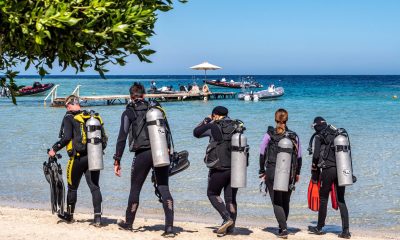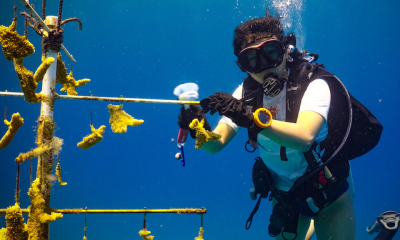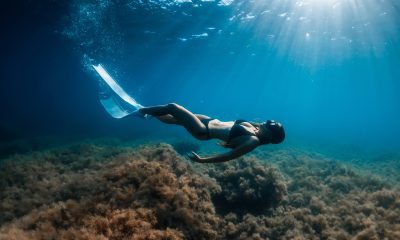News
American Freediving Records Fall at Caribbean Cup 2016
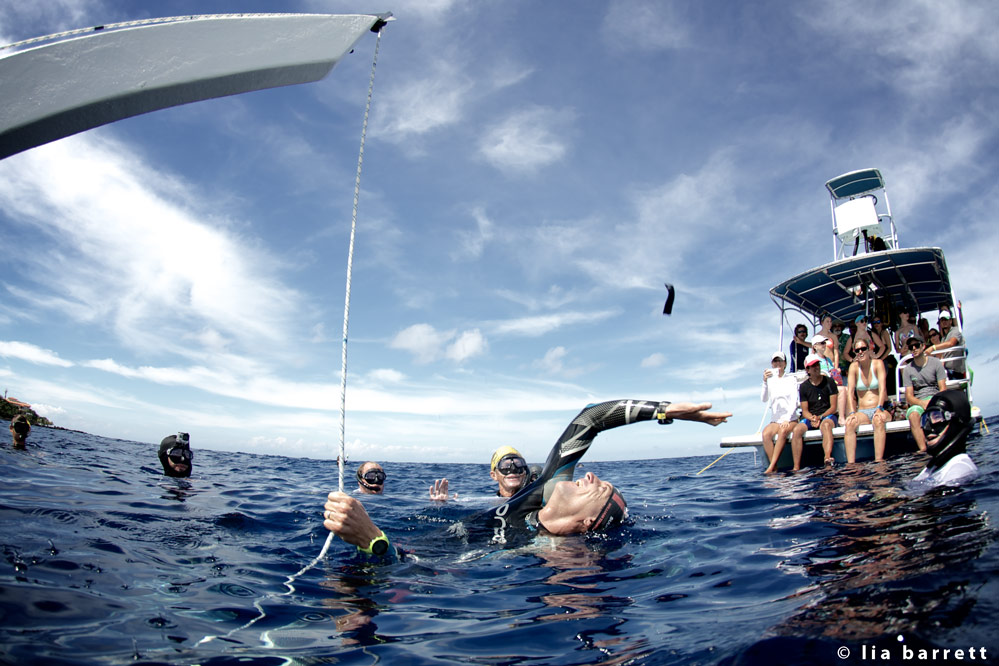
Kurt Chambers and Ashley Chapman have been whipping up a storm at this year’s Caribbean Cup, an annual freediving competition based on the island of Roatan off of the coast of Honduras. They have collectively set four new nation records, two each, over the course of the seven day event. They both did so in Constant Weight (CWT) and Free Immersion (FIM).
Ashley, who hails from Wilmington, NC, broke her own USA Freediving National Records with a CWT dive on May 28 diving to eighty-three meters / 272 feet surpassing her previous record by one meter / three feet set in 2012. She bettered her FIM record June 1 with a depth of eight-three meters / 272 feet bettering her previous record by two meters / seven feet set at the same event in 2012 in the Bahamas. Ashley’s dives took two minutes forty-one seconds and three minutes twenty-seven seconds respectively.
Kurt, who lives in Kona on the big island of Hawaii, reset his own record in FIM with a dive to ninety-four meters / 308 feet bettering the old record by two meters / one foot set last year at this event. He became the second American to enter the sport’s figurative 100 meter club with a CWT dive of 101 meters / 331 feet on May 31. This dive betters the previous record set by Nick Mevoli by one meter / three feet set in 2013 at this event. Nick’s untimely death later the same year remains the sport’s only fatality in competition. Adam Skolnick’s book One Breath, telling the story of Nick’s life and the incident, has taken Nick’s story well beyond the usual reach of freediving. Kurt’s dives took two minutes fifty-nine seconds and two minutes fifty seconds respectfully.
Ashley won the overall gold for the event tying with Sofia Gomez Uribe of Columbia, winning gold medals in CNF and FIM and a bronze in CWT in the individual events. Kurt won the overall silver medal with a silver medal in CWT and a bronze medal in FIM.
Kurt said, “I was never acquainted with Nick Mevoli, who held the CWT record for the last three years and was the first American to reach 100 meters. But his accomplishments, though I was envious of them at the time, did provide motivation, as he demonstrated that USA freedivers could still be competitive internationally. I regret that he and I won’t be able to compete against one another, as we would have enjoyed a close-matched and hopefully friendly rivalry. Perhaps we could also have been teammates on a strong USA Freediving Team at world championships.”
He stated further, “This record (CWT) means more to me than my previous in FIM because it was harder to earn, the culmination of more work on different skills both in the ocean and pool. It also remained out of reach for so long that it feels like it took me years of pursuit to accomplish. To have earned it before the end of the comp, along with hopefully placing well in the overall standing, makes me feel like I got a bit lucky here. It’s a testament to how favorable the circumstances are at the Caribbean Cup.”
Ashley said, “This training season has been a humbling one…and I’m grateful for that! I’ve been struggling with depth and my no fins dives have felt hard, but I have used the set back to work on dropping any pride that I’m carrying around. After failing yesterday’s record attempt and letting my pride creep in and make me sour, it felt great to let it all go and just focus on relaxing and being grateful for my dives and my beautiful family.”
Kurt is a long time waterman who has been creating captivating freediving images and teaching freediving through his company Hawaii Freediving. He has been freediving for many years and has been on a record run for the past two years. His breathtaking images can be found on Instagram @chambersbelow .
Ashley is a three-time freediving world record holder having held over ten national records. She teaches freediving with her husband Ren with their company Evolve Freediving. She has been away from competitive freediving for a couple of years having given birth to their daughter Ani in 2014. This competition certainly establishes that she is back in form and picking up where she left off.
Americans Daniel Koval, Ty Rothschild, and Kerry Hollowell are also participating in this event.
The Caribbean Cup is an annual event that is hosted by Esteban Darhanpe of Roatan Freediving in the sheltered waters of West Bay on the island of Roatan. The event headquarters are based at the Mayan Princess Beach and Dive Resort, and The Beach Club San Simon. The event includes all three freediving depth disciplines (Constant Weight CWT, Constant No Fins CNF, Free Immersion FIM) crowning the best of depth; awarding the overall winner with the most points from all three performances. This year’s event featured athletes from thirteen different countries. For more information visit roatanfreediving.com.
Constant No Fins (CNF) is one of the most difficult of competitive freediving disciplines, as it requires the athlete to swim to depth and back under their own power with no swimming aids while holding their breath. The athlete may only use arm and leg strokes to perform. The motion is a modified breaststroke style.
Constant Weight (CWT) challenges the athlete to swim to depth and back with the use of fins or a mono fin under their own power while holding their breath. The athlete is not allowed to contact the competition line other than to recover their tag at depth while turning. Upon reaching the surface the athlete must perform a surface protocol within fifteen seconds of their return to the surface. Constant Weight is one of the most respected and contested disciplines in freediving.
Free Immersion (FIM) is the freediving discipline that requires the athlete to pull their way to depth and back using their hands to pull down and up the competition line while holding their breath. It is one of three recognized self-powered disciplines in the diving to depth arena. The other two are constant weight and constant weight without fins. Both require the athlete to swim to depth and return under their own power.
USA Freediving is a non-profit association founded on a democratic representation of freediving within the United States and internationally. Founded in 2003, USA Freediving brought together a diverse group of 21 founding members, all interested in the development and growth of freediving. In just six months, this highly dedicated group was able to create an association recognized as the voice of freediving in the United States by the international community. The association has grown to over one hundred members with continued growth expected. For more information visit www.usafreediving.com.
The International Association for the Development of Freediving, AIDA, is the international sanctioning body for freediving, individual and team competition, and freediving world record attempts. For more information about AIDA visit www.aidainternational.org.
Photo: Lia Barrett
Blogs
Northern Red Sea Reefs and Wrecks Trip Report, Part 3: The Mighty Thistlegorm
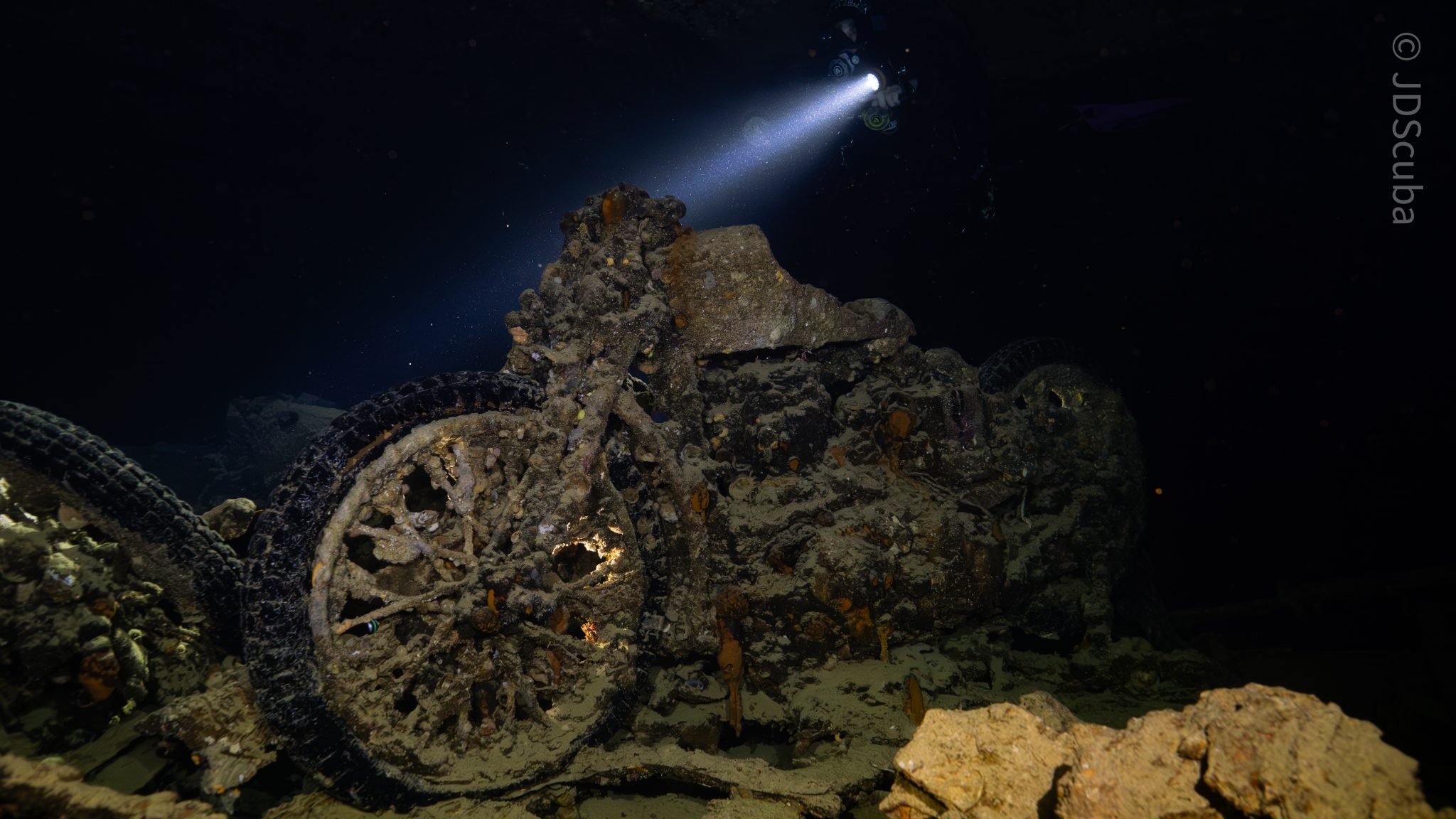
Jake Davies boards Ghazala Explorer for an unforgettable Red Sea diving experience…
Overnight, the wind picked up, making the planned morning dive a bit bumpy on the Zodiacs to the drop point on Thomas Reef. There, we would dive along the reef before descending through the canyon and then passing under the arch before ascending the wall with a gentle drift. The site provided great encounters with more pelagic species, including shoals of large barracuda, tuna, and bigeye trevally.
Once back on the boat, it was time to get everything tied down again as we would head back south. This time, with the wind behind us, heading to Ras Mohammed to dive Jackfish Alley for another great gentle drift wall dive before then heading up the coast towards the Gulf of Suez to moor up at the wreck of the Thistlegorm. This being the highlight wreck dive of the trip and for many onboard, including myself, it was the first time diving this iconic wreck. I had heard so much about the wreck from friends, and globally, this is a must on any diver’s list. Fortunately for us, there was only one other boat at the site, which was a rarity. A great briefing was delivered by Ahmed, who provided a detailed background about the wreck’s history along with all the required safety information as the currents and visibility at the site can be variable.
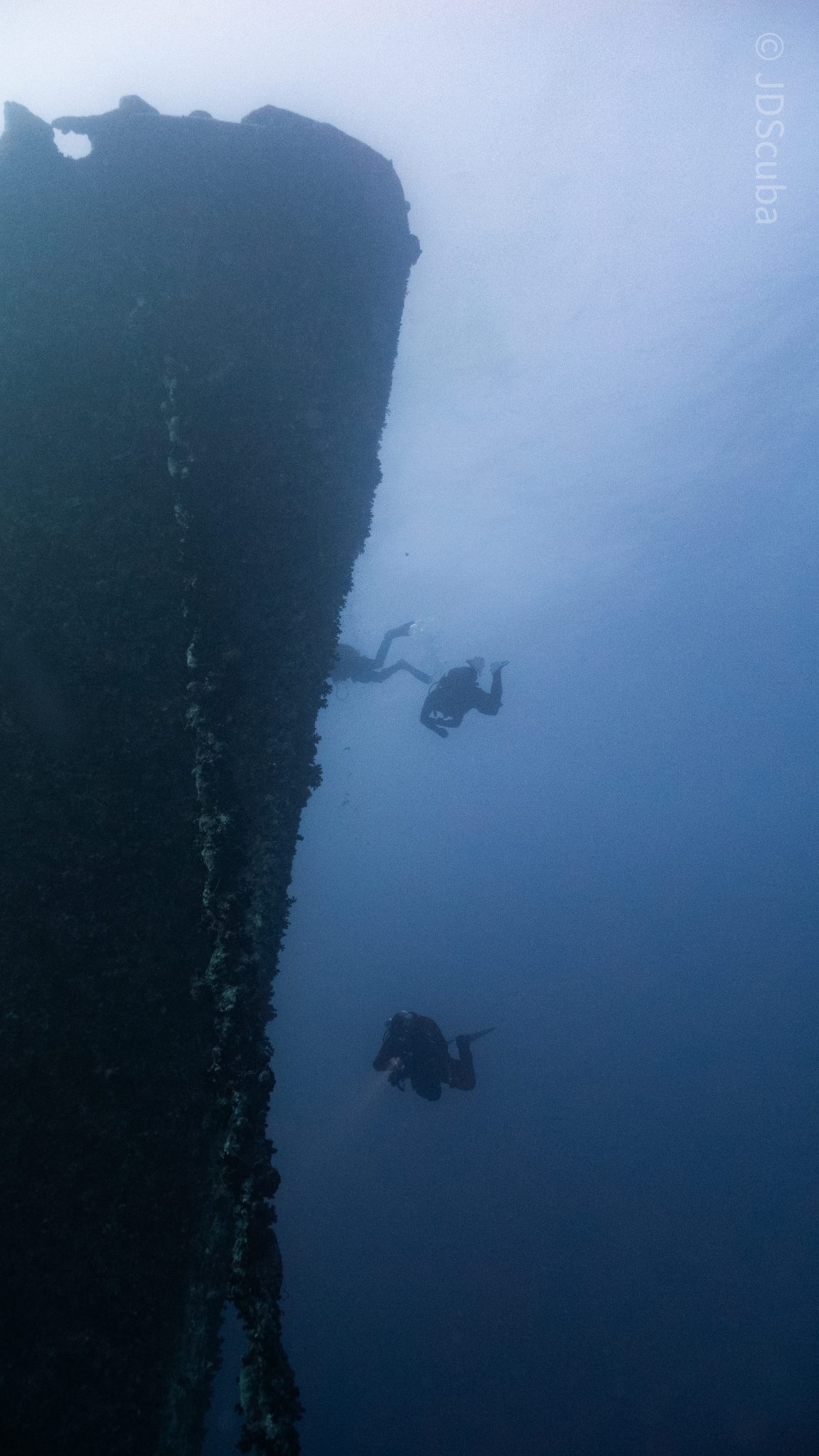
Kitting up, there was a lot of excitement on deck before entering the water and heading down the shoreline. Descending to the wreck, there was a light northerly current which reduced the visibility, making it feel more like the conditions that can be found off the Welsh coast. At 10m from the bottom, the outline of the wreck appeared as we reached the area of the wreck which had been bombed, as our mooring line was attached to part of the propeller shaft. Arriving on deck, instantly everywhere you looked there were many of the supplies which the ship was carrying, including Bren Carrier tanks and projectiles that instantly stood out.
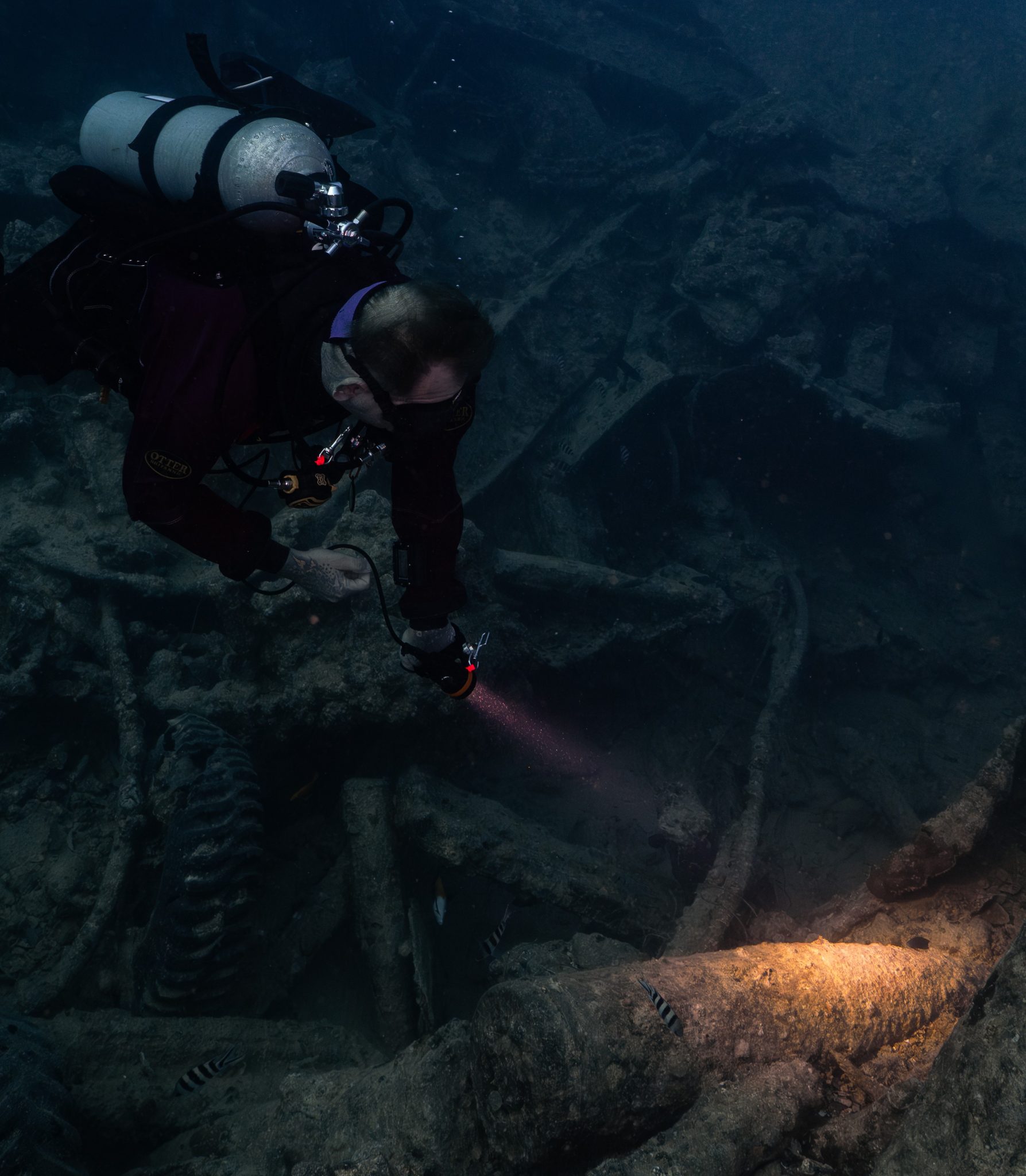
We headed around the exterior, taking a look at the large propeller and guns mounted on deck before entering the wreck on the port side to take a look in the holds. It was incredible to see all the trucks, Norton 16H, and BSA motorcycles still perfectly stacked within, providing a real snapshot in time.
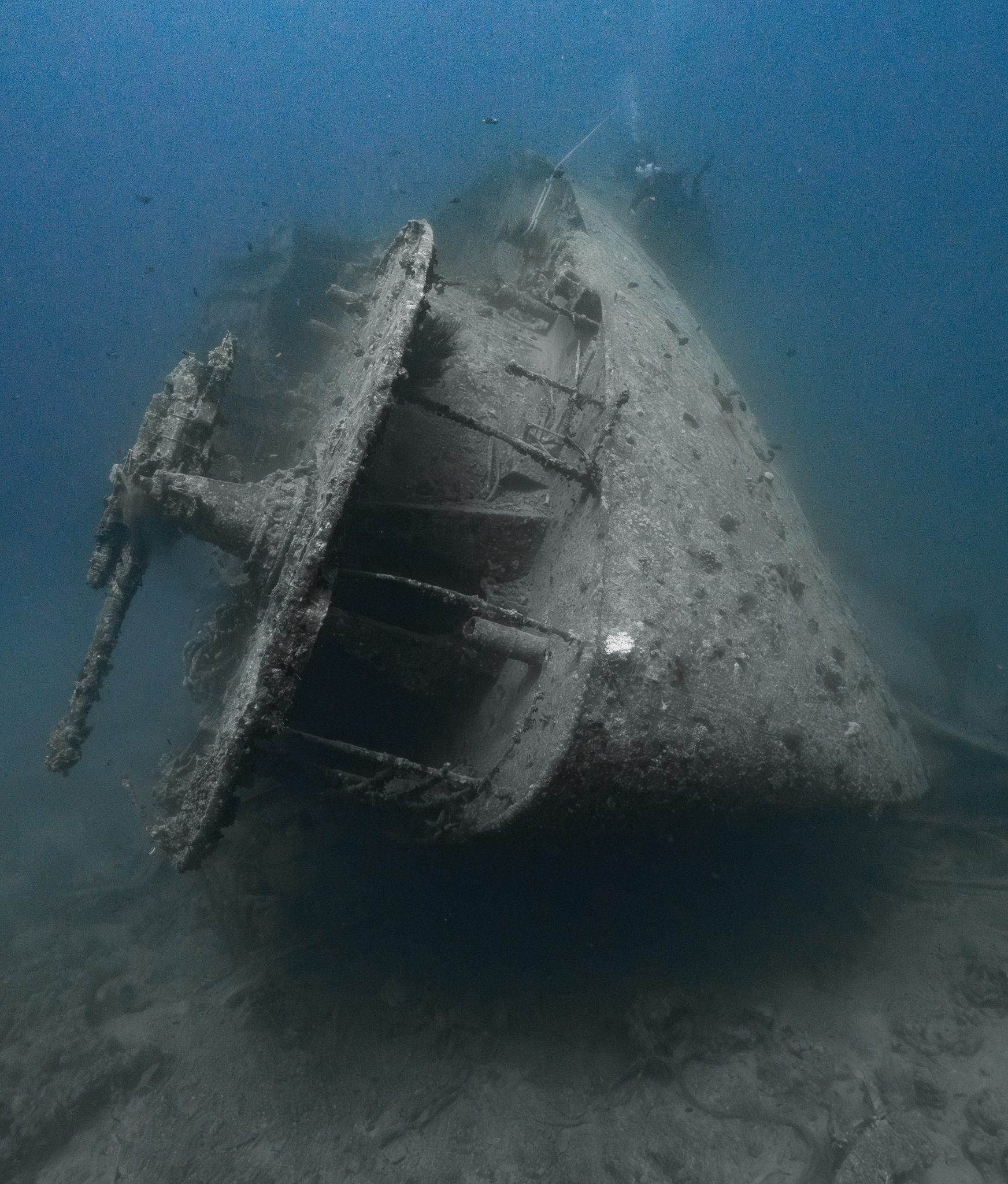
Overall, we had four dives on the Thistlegorm, where for all of the dives we were the only group in the water, and at times, there were just three of us on the whole wreck, which made it even more special, especially knowing that most days the wreck has hundreds of divers. Along with the history of the wreck, there was plenty of marine life on the wreck and around, from big green turtles to batfish, along with shoals of mackerel being hunted by trevally. Some unforgettable dives.
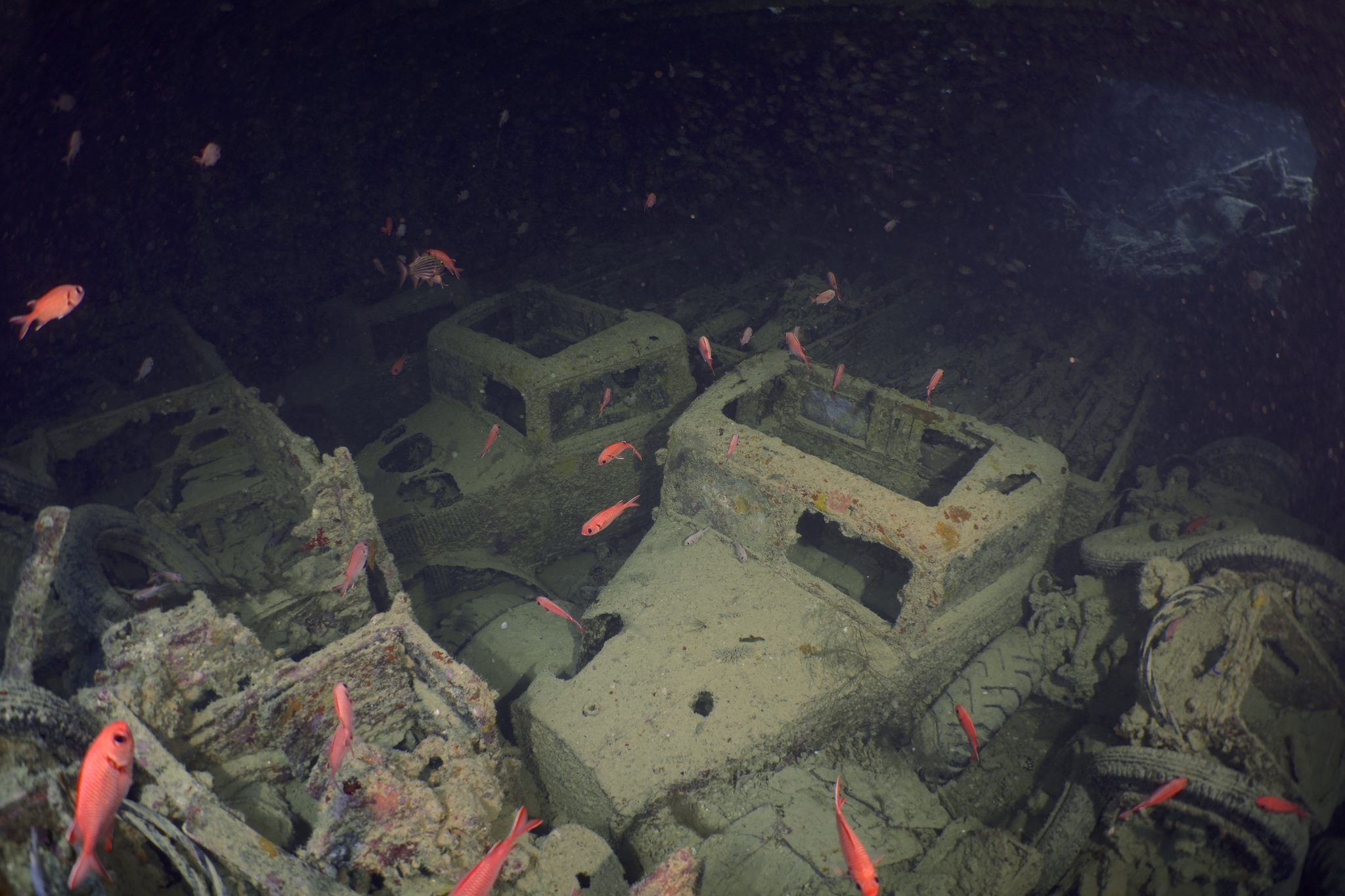
The final leg of the trip saw us cross back over the Suez Canal to the Gobal Islands where we planned to stay the night and do three dives at the Dolphin House for the potential of sharing the dive with dolphins. The site, which included a channel that was teeming with reef fish, especially large numbers of goatfish that swam in large shoals along the edge of the reef. These were nice relaxing dives to end the week. Unfortunately, the dolphins didn’t show up, which was okay as like all marine life they are difficult to predict and you can’t guarantee what’s going to be seen. With the last dive complete, we headed back to port for the final night where it was time to clean all the kit and pack before the departure flight the next day.
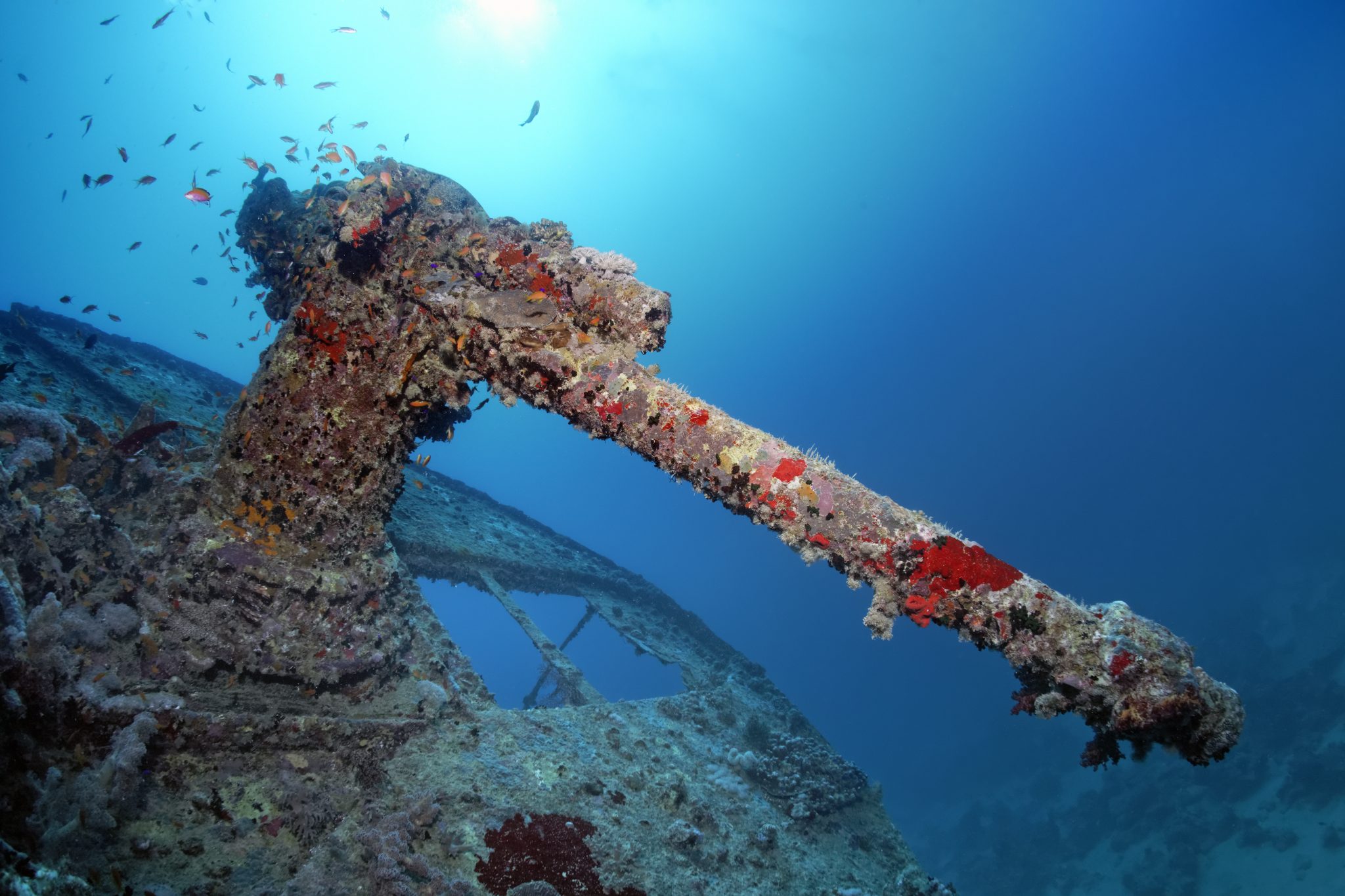
The whole week from start to finish on Ghazala Explorer was amazing; the boat had all the facilities you need for a comfortable week aboard. The crew were always there to help throughout the day and the chefs providing top quality food which was required after every dive. The itinerary providing some of the best diving with a nice mixture of wreck and reef dives. I would recommend the trip to anyone, whether it’s your first Red Sea liveaboard in the Red Sea or you’re revisiting. Hopefully, it’s not too long before I head back to explore more of the Red Sea onboard Ghazala Explorer.
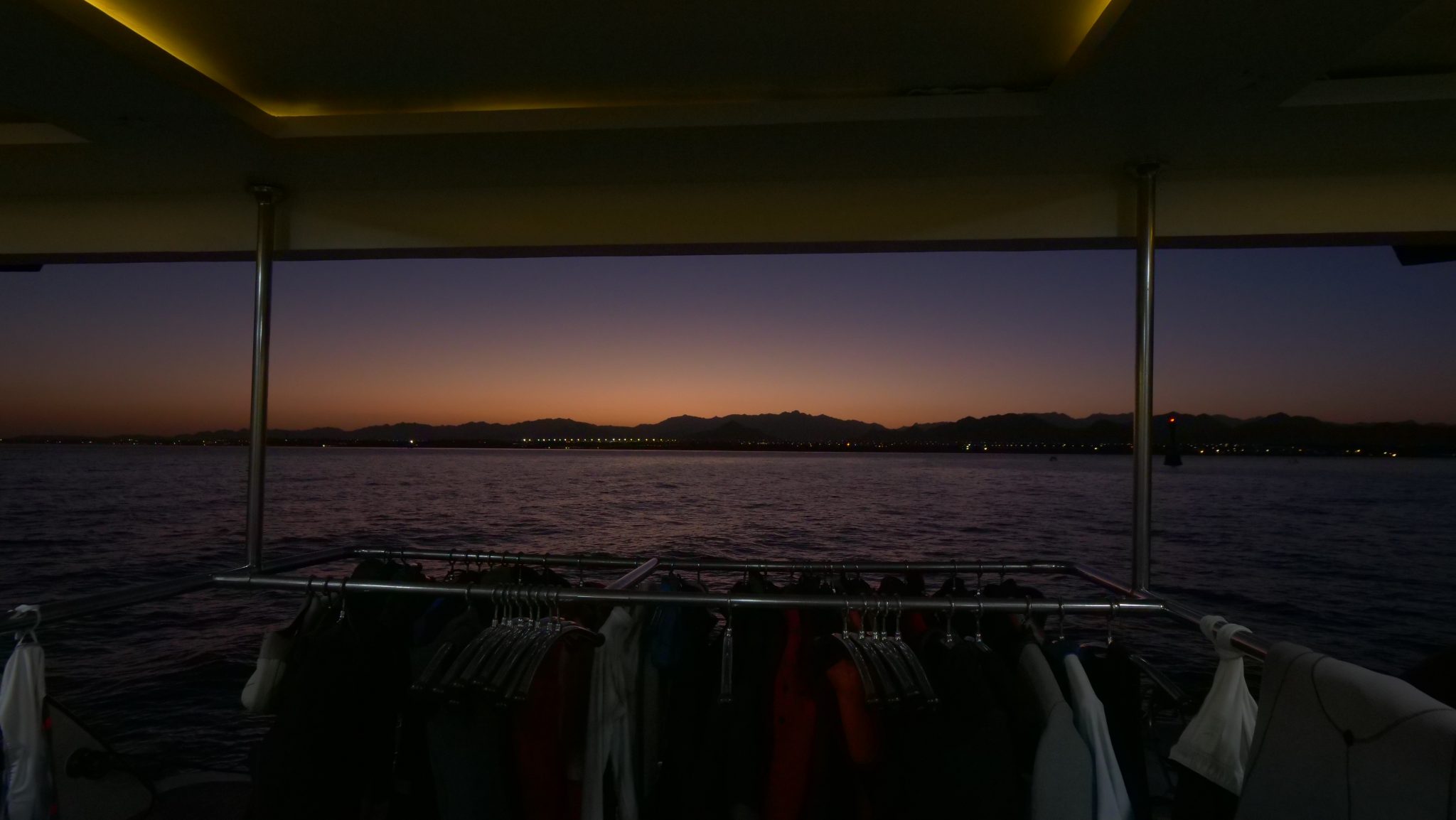
To find out more about the Northern Red Sea reef and wrecks itineraries aboard Ghazala Explorer, or to book, contact Scuba Travel now:
Email: dive@scubatravel.com
Tel: +44 (0)1483 411590
Photos: Jake Davies / Avalon.Red
Blogs
Northern Red Sea Reefs and Wrecks Trip Report, Part 2: Wall to Wall Wrecks
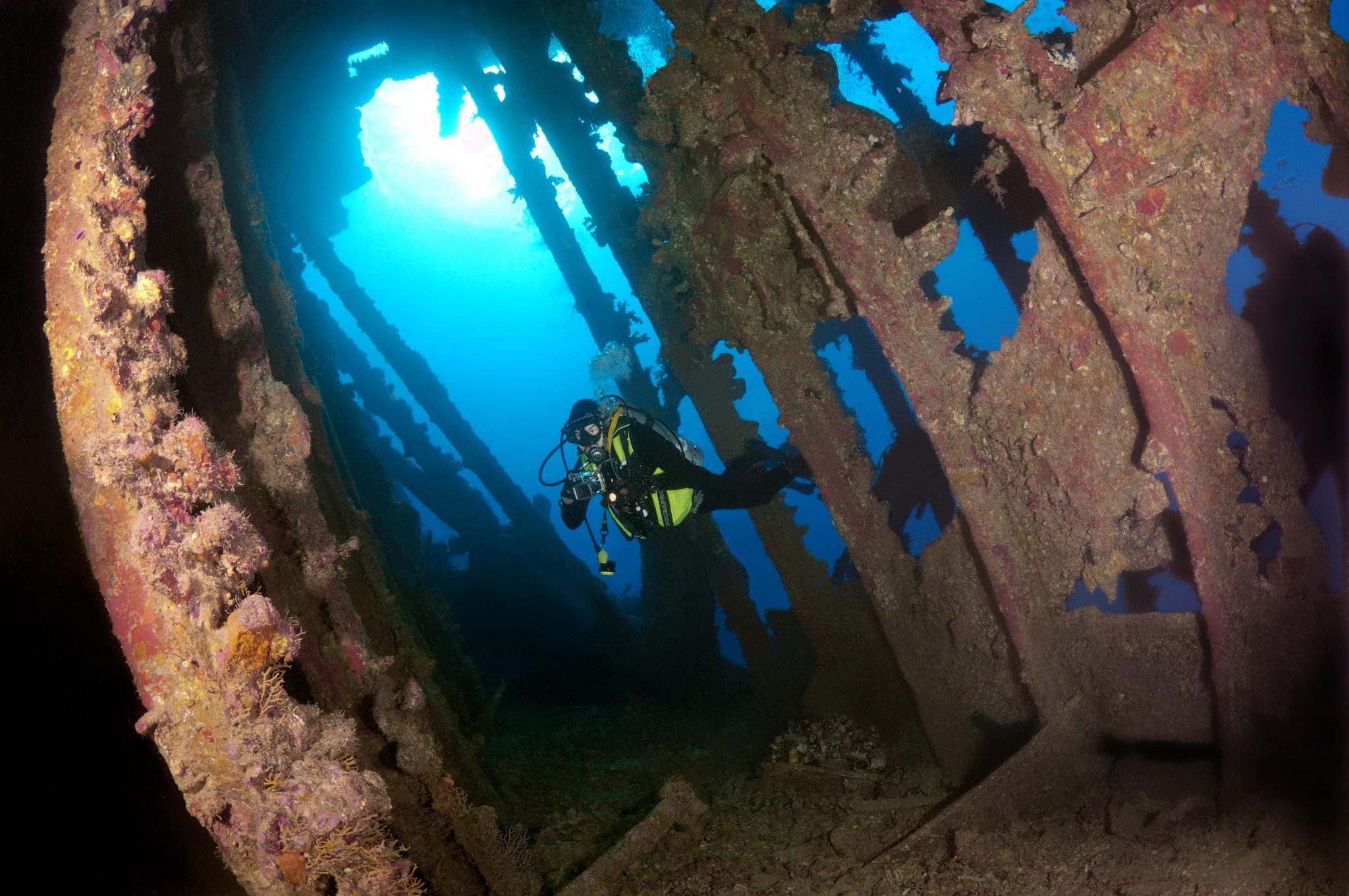
Jake Davies boards Ghazala Explorer for an unforgettable Red Sea diving experience…
The second day’s diving was a day full of wreck diving at Abu Nuhas, which included the Chrisoula K, Carnatic, and Ghiannis D. The first dive of the day was onto the Chrisoula K, also known as the wreck of tiles. The 98m vessel remains largely intact where she was loaded with tiles which can be seen throughout the hold. The stern sits at 26m and the bow just below the surface. One of the highlights of the wreck is heading inside and seeing the workroom where the machinery used for cutting the tiles are perfectly intact. The bow provided some relaxing scenery as the bright sunlight highlighted the colours of the soft coral reef and the many reef fish.
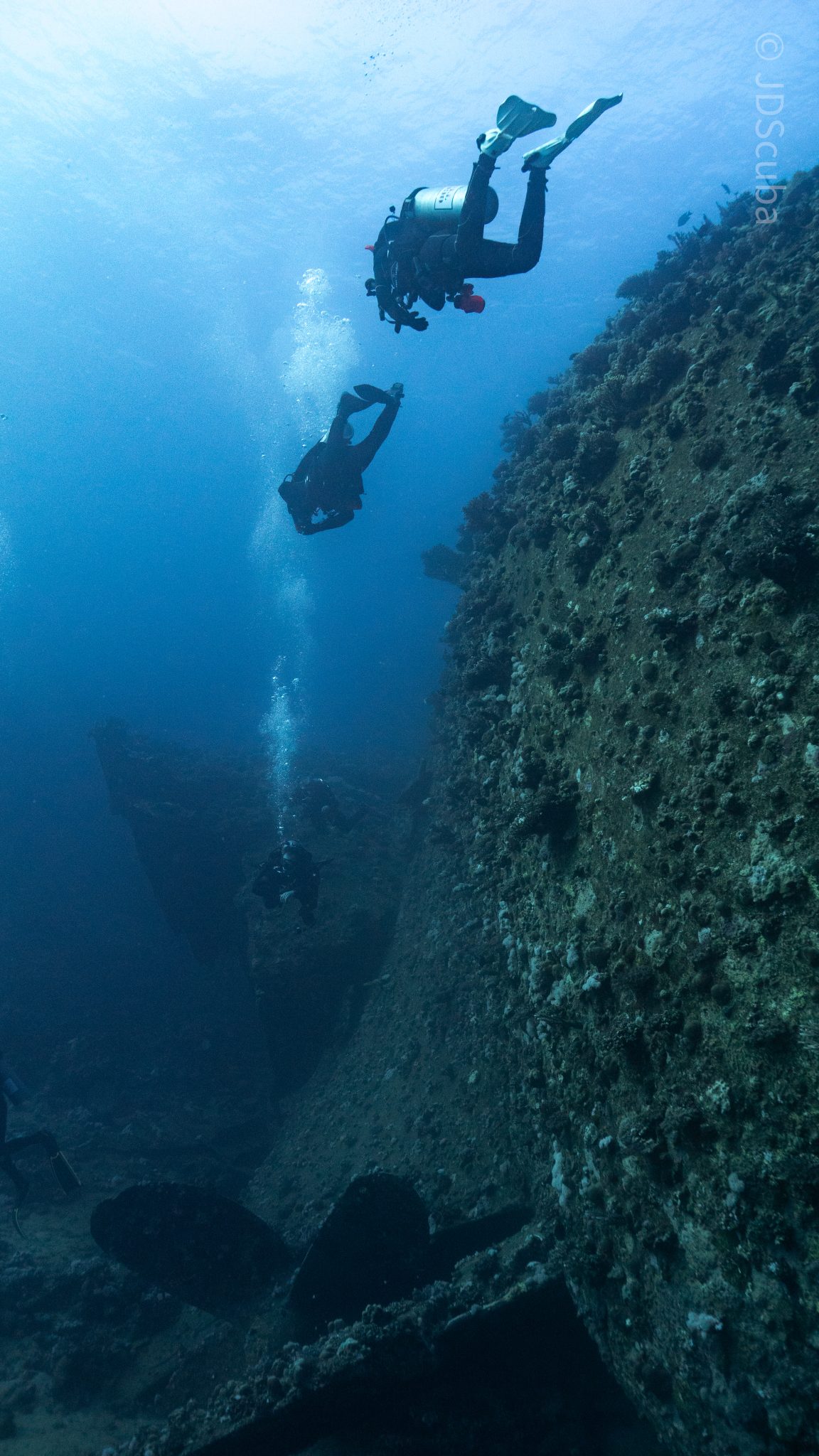
Following breakfast, we then headed to the next wreck, which was the Carnatic. The Carnatic is an 89.9m sail steamer vessel that was built in Britain back in 1862. She ran aground on the reef back in 1869 and remains at 27m. At the time, she was carrying a range of items, including 40,000 sterling in gold. An impressive wreck where much of the superstructure remains, and the two large masts lay on the seafloor. The wooden ribs of the hull provide structures for lots of soft corals, and into the stern section, the light beams through, bouncing off the large shoals of glass fish that can be found using the structure as shelter from the larger predators that are found outside of the wreck.
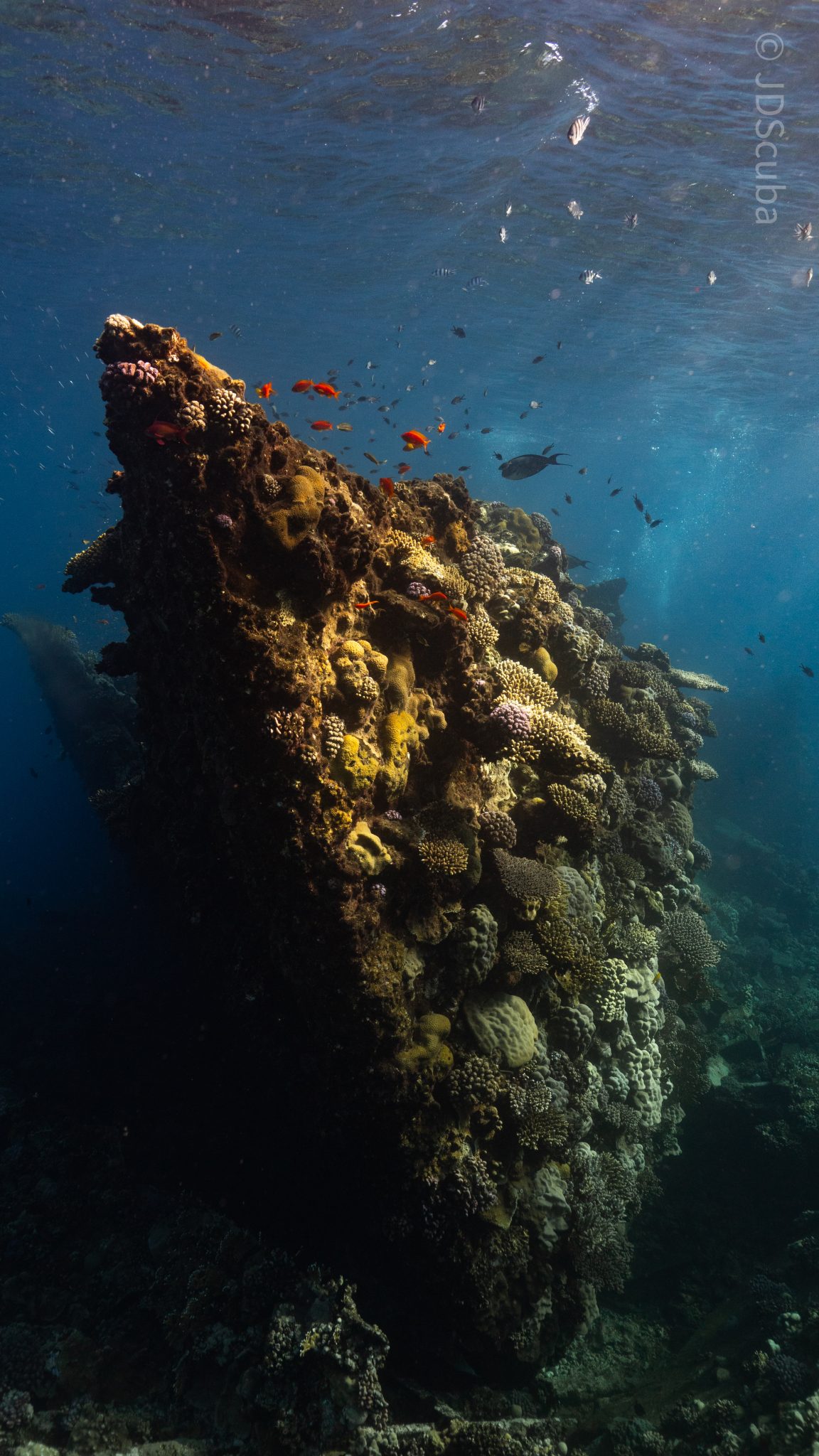
The final wreck at Abu Nuhas was the Ghiannis D, originally called ‘Shoyo Maru,’ which was 99.5m long and built in Japan back in 1969 before becoming a Greek-registered cargo ship in 1980. The ship then ran aground on the reef on April 19th, 1983, and now sits at the bottom at a depth of 27m. Heading down the line, the stern of the ship remains in good condition compared to the rest of the hull. The highlight of the wreck, though, is heading into the stern section and down the flights of stairs to enter the engine room, which remains in good condition and is definitely worth exploring. After exploring the interior section of the ship, we then headed over to see the rest of the superstructure, where it’s particularly interesting to see the large table corals that have grown at the bow relatively quickly considering the date the ship sank. After surfacing and enjoying some afternoon snacks, we made sure everything was strapped down and secured as we would be heading north and crossing the Gulf of Suez, where the winds were still creating plenty of chop.
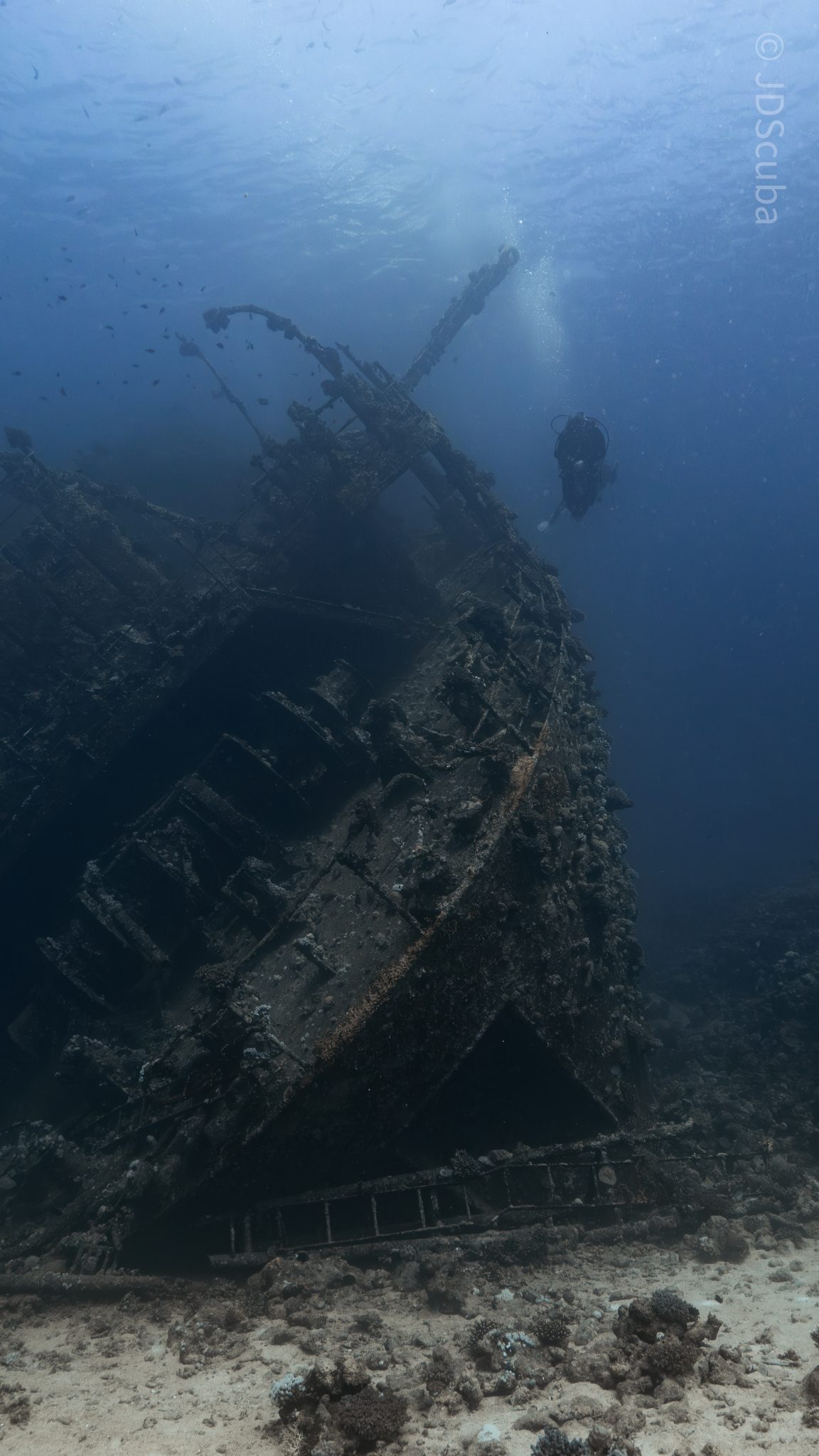
The next morning, it was a short hop to Ras Mohammed Nature Reserve for the next couple of days of diving. The 6am wake-up call came along with the briefing for the first site we would be diving, which was Shark & Yolanda. The low current conditions allowed us to start the dive at Anemone City, where we would drift along the steep, coral-filled wall. These dives involved drifts, as mooring in Ras Mohammed wasn’t allowed to protect the reefs. As a dive site, Shark & Yolanda is well-known and historically had a lot of sharks, but unfortunately not so many in recent years, especially not so early in the season. However, there was always a chance when looking out into the blue.
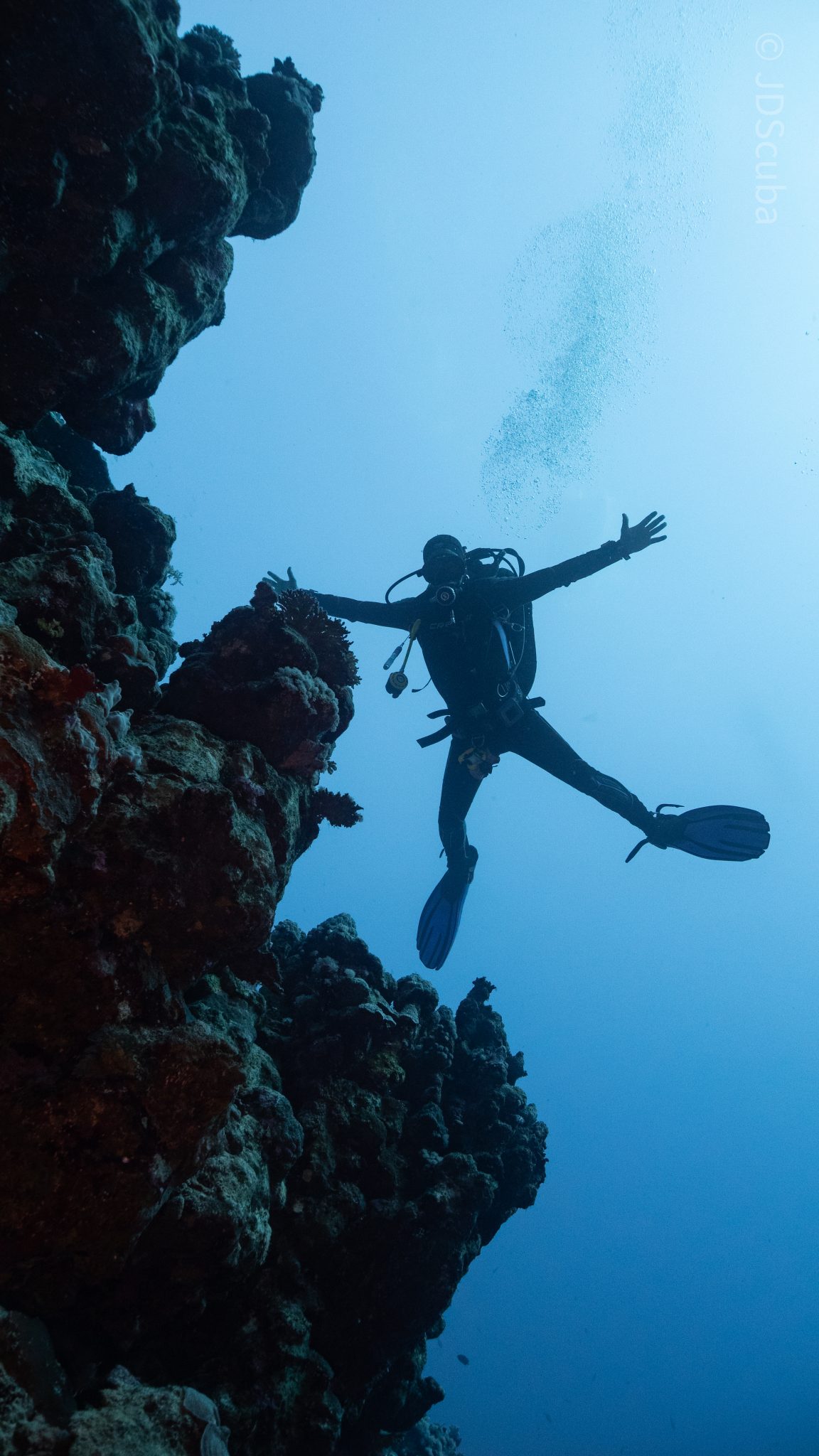
The gentle drift took us along the steep walls of the site, with plenty of anemone fish to be seen and a huge variety of corals. It wasn’t long into the dive before we were accompanied by a hawksbill turtle, who drifted with us between the two atolls before parting ways. Between the two reefs, the shallow patch with parts of coral heads surrounded by sand provided the chance to see a few blue-spotted stingrays that were mainly resting underneath the corals and are always a pleasure to see. With this being the morning dive, the early sunlight lit up the walls, providing tranquil moments. Looking out into the blue, there was very little to be seen, but a small shoal of batfish shimmering underneath the sunlight was a moment to capture as we watched them swim by as they watched us.
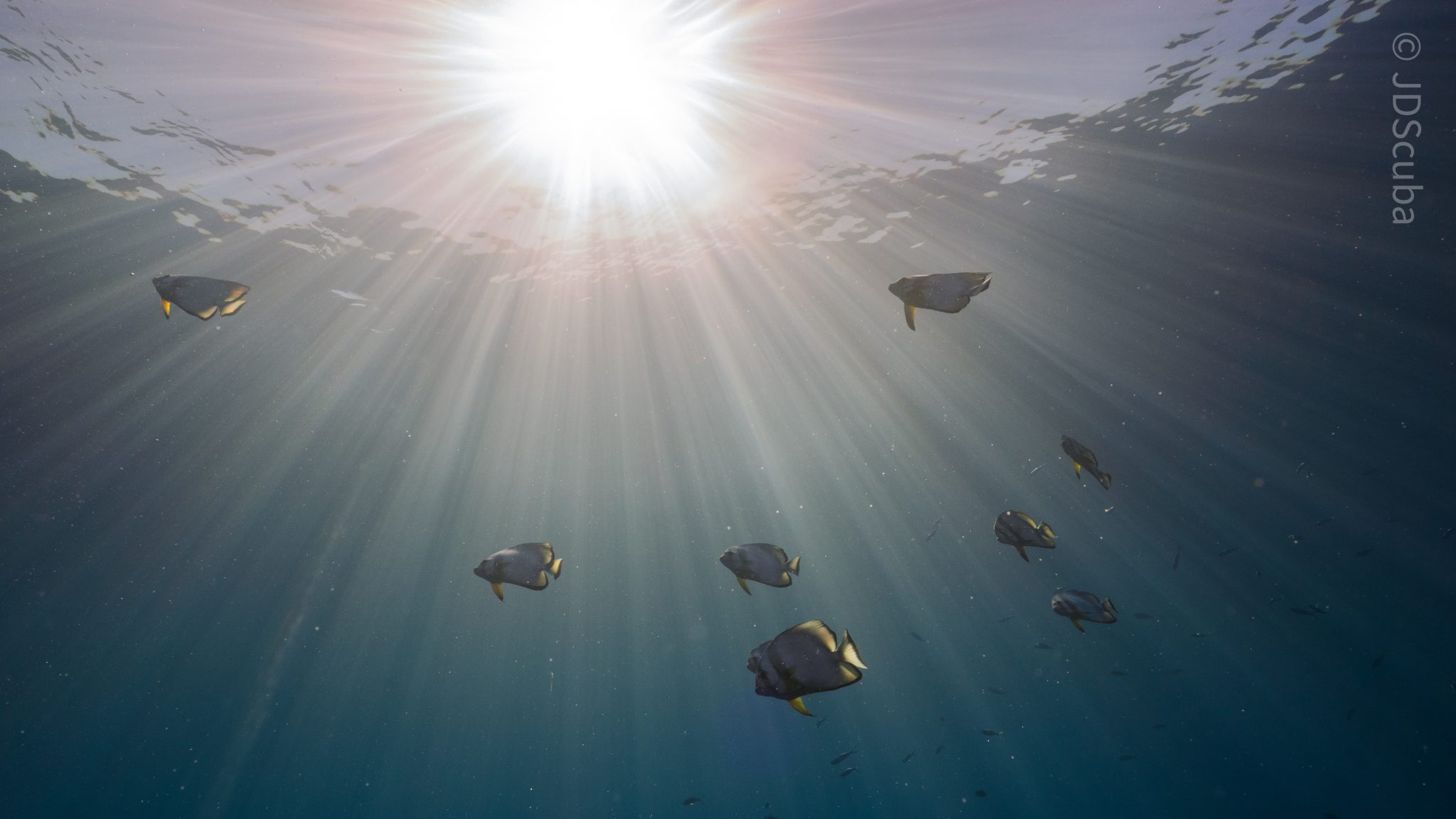
Towards the end of the dive, we stopped at the wreck of the Jolanda where the seafloor was scattered with toilets from the containers it was carrying. This provided a unique site to make a safety stop, which was also accompanied by a large barracuda slowly swimming by, along with a hawksbill turtle calmly swimming over the reef as the sun rays danced in the distance.
For the next dive, we headed north to the Strait of Tiran to explore the reefs situated between Tiran Island and Sharm El Sheik, which were named after the British divers who had found them. We started on Jackson before heading to Gordons Reef, where we also did the night dive. All the atolls at these sites provided stunning, bustling coral reefs close to the surface and steep walls to swim along, which always provided the opportunity to keep an eye out for some of the larger species that can be seen in the blue. Midwater around Jackson Reef was filled with red-toothed triggerfish and shoals of banner fish, which at times were so dense that you couldn’t see into the blue. Moments went by peacefully as we enjoyed the slow drift above the reef, watching these shoals swim around under the mid-afternoon sun.
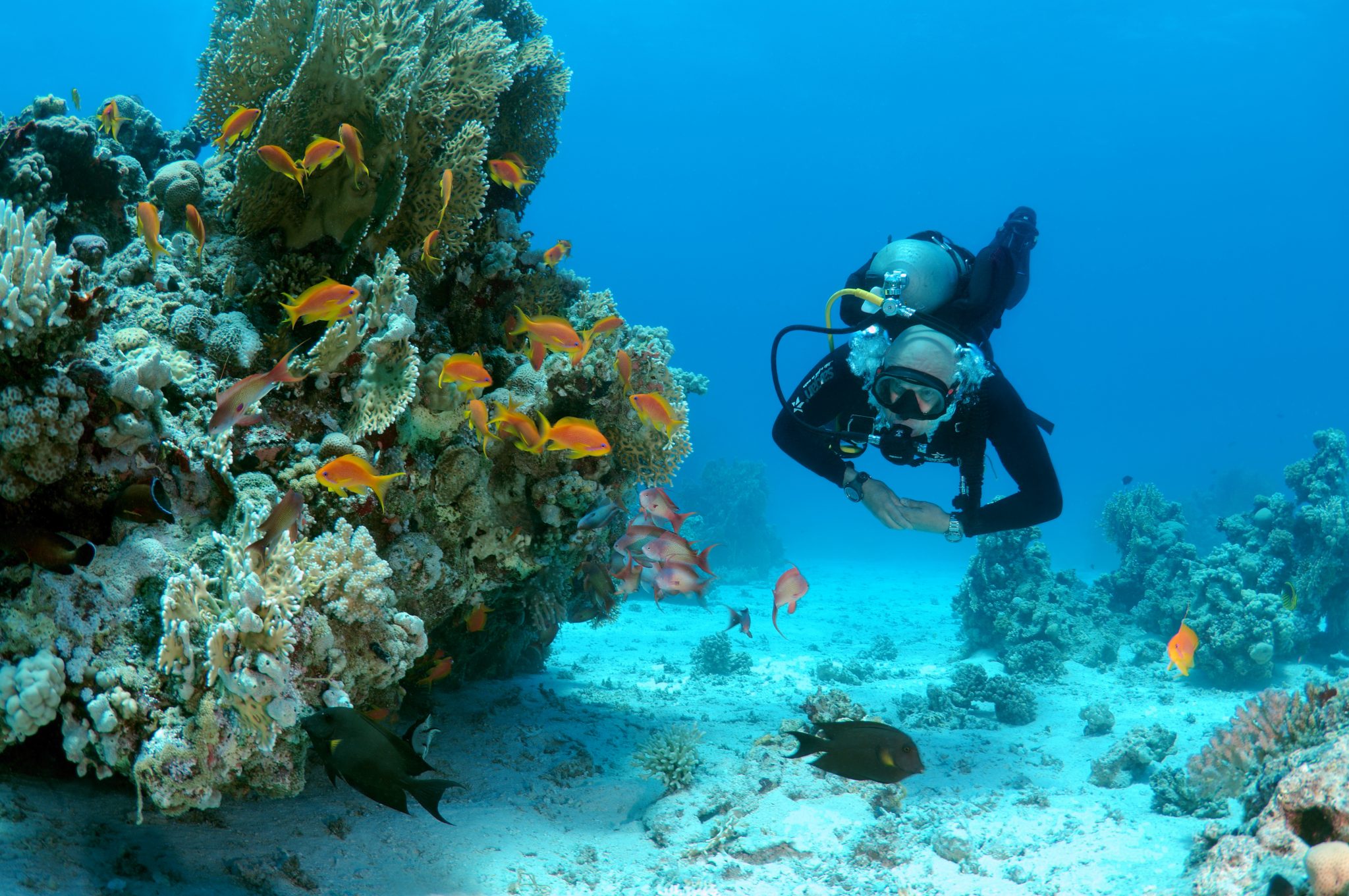
The night dive at Gordon’s Reef was mainly among the stacks of corals surrounded by sand, which was great to explore under the darkness. After some time circling the corals, we came across what we were really hoping to find, and that was an octopus hunting on the reef. We spent the majority of the dive just watching it crawl among the reef, blending into its changing surroundings through changes in colour and skin texture. It’s always so fascinating and captivating to watch these incredibly intelligent animals, in awe of their ability to carry out these physical changes to perfectly blend into the reef. Before we knew it, it was time to head back to the boat to enjoy a well-deserved tasty dinner prepared by the talented chefs onboard.
Check in for the 3rd and final part of this series from Jake tomorrow!
To find out more about the Northern Red Sea reef and wrecks itineraries aboard Ghazala Explorer, or to book, contact Scuba Travel now:
Email: dive@scubatravel.com
Tel: +44 (0)1483 411590
Photos: Jake Davies / Avalon.Red
-

 News3 months ago
News3 months agoHone your underwater photography skills with Alphamarine Photography at Red Sea Diving Safari in March
-

 News3 months ago
News3 months agoCapturing Critters in Lembeh Underwater Photography Workshop 2024: Event Roundup
-

 Marine Life & Conservation Blogs2 months ago
Marine Life & Conservation Blogs2 months agoCreature Feature: Swell Sharks
-

 Blogs2 months ago
Blogs2 months agoMurex Resorts: Passport to Paradise!
-

 Blogs2 months ago
Blogs2 months agoDiver Discovering Whale Skeletons Beneath Ice Judged World’s Best Underwater Photograph
-

 Gear Reviews3 months ago
Gear Reviews3 months agoGear Review: Oceanic+ Dive Housing for iPhone
-

 Marine Life & Conservation2 months ago
Marine Life & Conservation2 months agoSave the Manatee Club launches brand new webcams at Silver Springs State Park, Florida
-

 News3 months ago
News3 months agoWorld’s Best Underwater Photographers Unveil Breathtaking Images at World Shootout 2023








